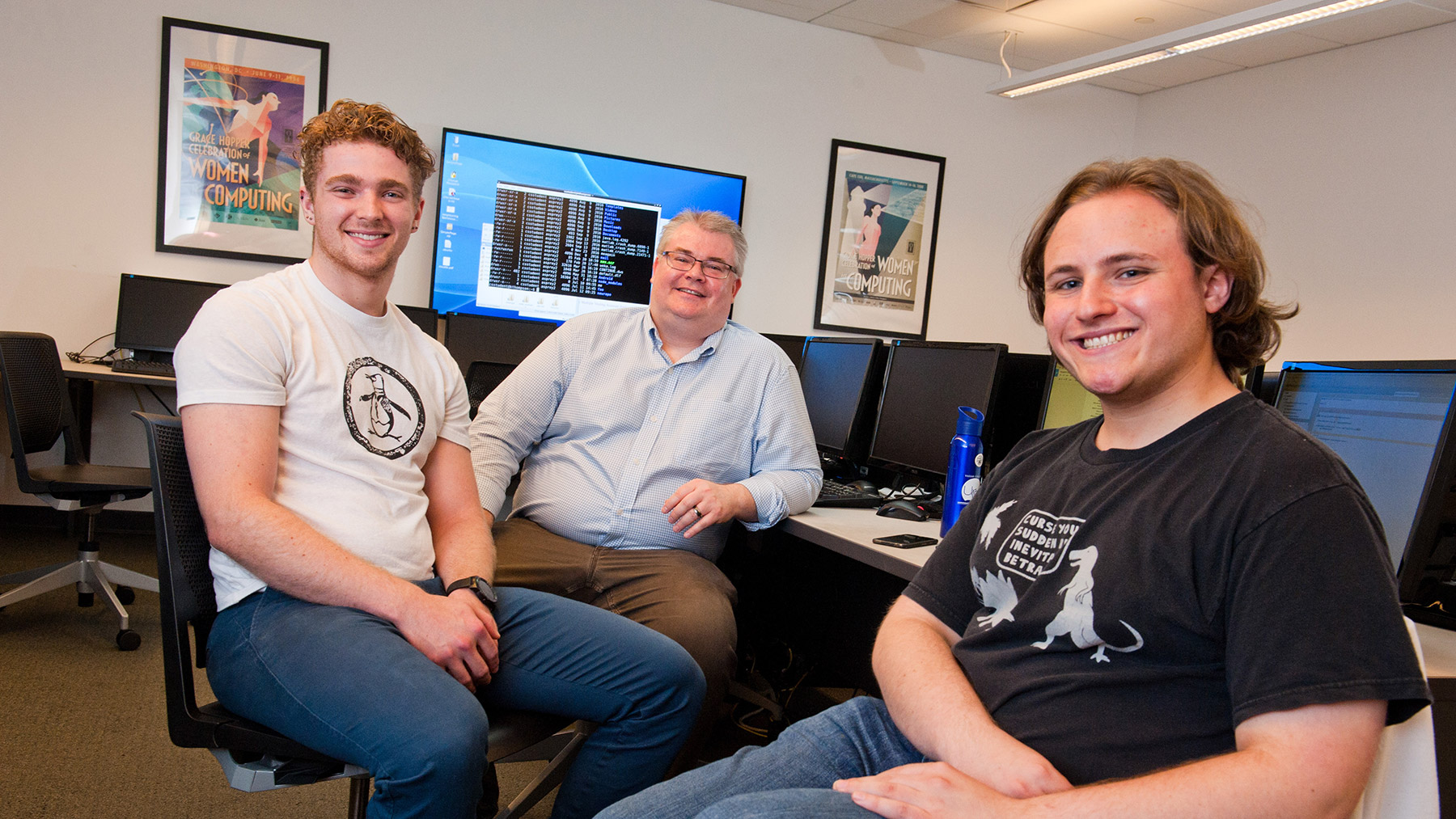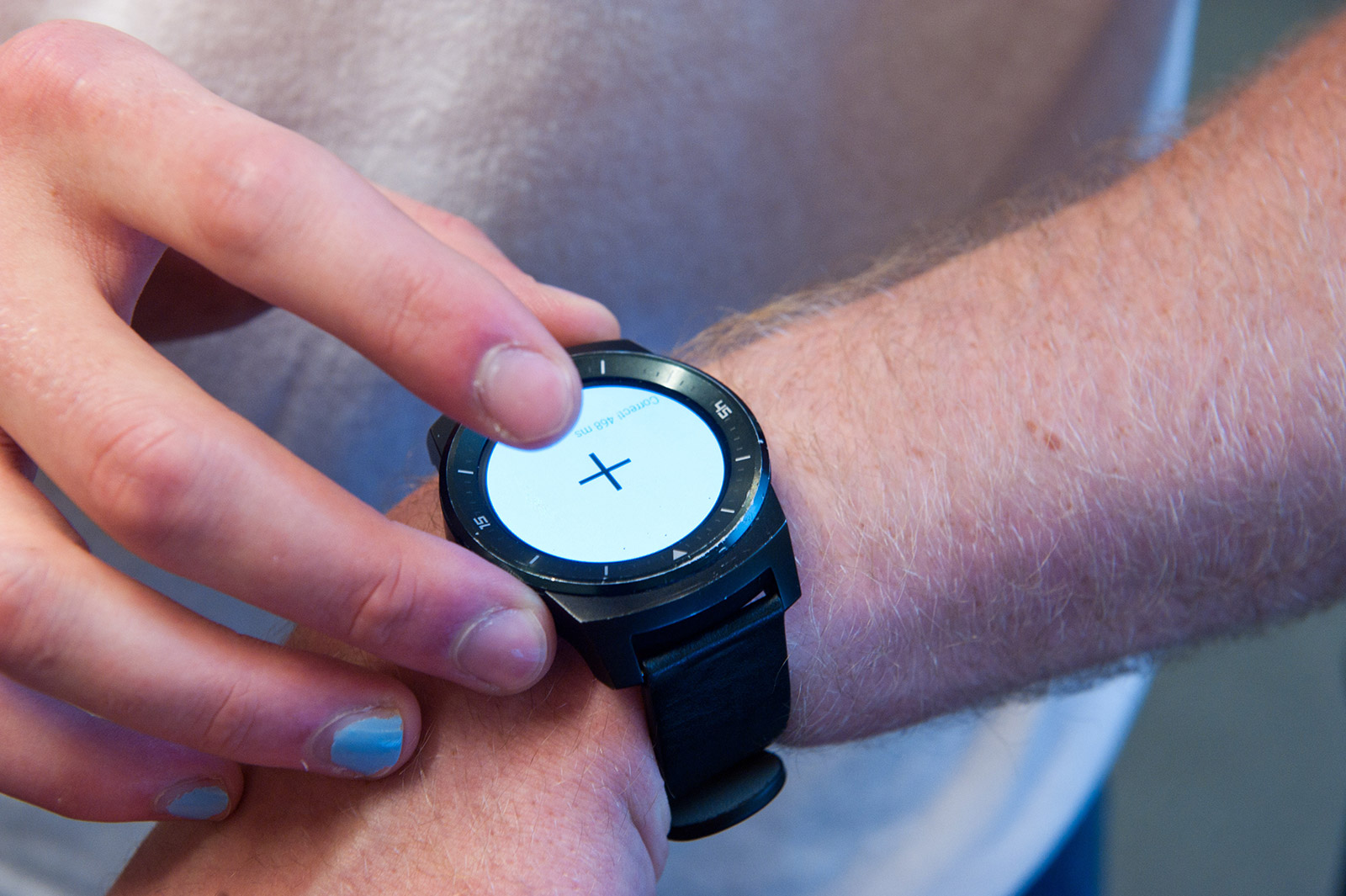Undergraduate Research Summer InstituteAn App To Test Impulsivity
Undergraduate Research Summer InstituteAn App To Test Impulsivity
Many people have apps on their smart phones that track how far they walk each day and how many flights of stairs they climb. Researchers at Cornell Tech in New York City are devising new tests to help individuals and their physicians monitor their health in other ways on their personal devices, and this summer, Assistant Prof. of Computer Science Jason Waterman and two of his students joined the project.

Working under the auspices of Vassar’s Undergraduate Research Summer Institute, George Whiteside ’18 and Dylan Horowitz ’19 adapted a quick and user-friendly impulsivity test so that it can be administered not only on smart phones but also on smart watches and voice-activated virtual assistant devices such as Google Assistant. The software was written so that data collected through all such devices can be stored on a single, secure server.
“It’s useful for your doctor to know how impulsive you are as he assesses your overall health and potential for illness.”
The test asks users to “pump” a virtual balloon that is programmed to “pop” randomly as early as the first pump. The odds of the balloon popping increase for each successive pump until they reach 50 percent in the 11th round. Users are rewarded with virtual “cash” for each successful pump, but they lose all of their money if they pop the balloon. Impulsivity – someone’s inability to balance short term rewards with long term consequences – has been linked to obesity, substance abuse, and other physical and psychological disorders, Waterman says, and people who “pop” a lot of the balloons are demonstrating such impulsivity. “It’s useful for your doctor to know how impulsive you are as he assesses your overall health and potential for illness,” he says.
Whiteside, a computer science major from Fairfield, CT, spent the summer developing and adapting software that enabled the balloon test to be used on wearable devices such as smart watches. Horowitz, a computer science major from Westchester, NY, adapted the test so that it can be used on virtual assistant devices.

The next step of the project: making the balloon test available to a large group of test subjects to find out which device they find most convenient. Whiteside and Horowitz began that phase of their study by administering the test to 30 students and faculty members—and one writer in the Communications Office—and then asking them which device they preferred. They also solicited suggestions on how to improve the test on each device. Waterman says preliminary results indicated the smart phone was a slight favorite, “but the watch and voice applications scored closely in acceptance and usability, and we got some great feedback on how to improve each of the interfaces.”
Waterman says he hopes and expects the work Whiteside and Horowitz did this summer will be the start of an ongoing relationship between Vassar and Cornell Tech. He and his students traveled to New York City in July to meet with the research team that is conducting the impulsivity study. One of the leaders of the team, Cornell Tech Dean and Prof. Deborah Estrin, told Waterman, “We are excited to have been able to work with you and your students in what we hope will be the first of many collaborations.”
“We did some things this summer that most undergraduates never have the opportunity to do.”
Whiteside said meeting the Cornell Tech team was gratifying. “It was great to talk to the professors and graduate students who worked on the code for this project and to be a part of it,” he says. “We did some things this summer that most undergraduates never have the opportunity to do.”
Horowitz agreed. “We shared lots of ideas, some we had thought of and some I’d never thought of, for the virtual assistant,” he says. “It was great being around a team of people who have been doing this kind of thing much longer than I have. Everything I learned was fascinating, and I was happy to have the opportunity to work in such depth on this project, to really sink my teeth into it.”
Waterman says he’s impressed with how much his students accomplished during the 10-week URSI program. “Almost all of what they did, they did on their own,” he says. “We accomplished all we set out to do; we were able to extend the test to two new platforms, and the brainstorming we did with the Cornell Tech people gave us momentum as we go forward.”